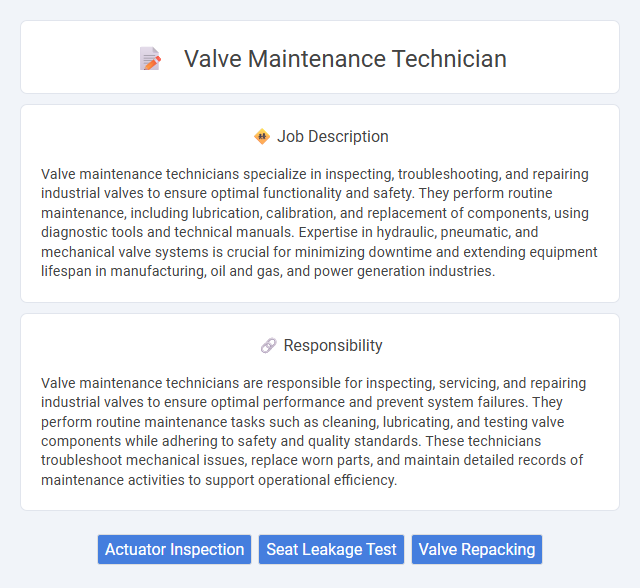
Valve maintenance technicians specialize in inspecting, troubleshooting, and repairing industrial valves to ensure optimal functionality and safety. They perform routine maintenance, including lubrication, calibration, and replacement of components, using diagnostic tools and technical manuals. Expertise in hydraulic, pneumatic, and mechanical valve systems is crucial for minimizing downtime and extending equipment lifespan in manufacturing, oil and gas, and power generation industries.
Individuals with strong mechanical aptitude and attention to detail are likely to be well-suited for a valve maintenance technician role. Those comfortable working in physically demanding and sometimes hazardous environments may find this job aligns with their strengths. Candidates who thrive on problem-solving and routine inspections probably have a higher probability of success in this position.
Qualification
Valve maintenance technicians require specialized knowledge in mechanical systems, including expertise in the inspection, repair, and calibration of industrial valves. Proficiency in reading blueprints, technical manuals, and using diagnostic tools ensures accurate troubleshooting and maintenance. Certifications such as those from the Valve Manufacturers Association (VMA) or relevant safety training enhance job performance and compliance with industry standards.
Responsibility
Valve maintenance technicians are responsible for inspecting, servicing, and repairing industrial valves to ensure optimal performance and prevent system failures. They perform routine maintenance tasks such as cleaning, lubricating, and testing valve components while adhering to safety and quality standards. These technicians troubleshoot mechanical issues, replace worn parts, and maintain detailed records of maintenance activities to support operational efficiency.
Benefit
Valve maintenance technician jobs likely offer competitive salaries and comprehensive benefits packages, including health insurance and retirement plans. There is a strong probability of skill development opportunities that enhance career growth and job security. Employees might also experience a safe working environment due to strict adherence to safety regulations and industry standards.
Challenge
Valve maintenance technician roles likely involve tackling complex mechanical issues that require precise diagnostic skills and technical knowledge. The challenge of working in potentially hazardous environments may necessitate strict adherence to safety protocols and continuous learning to stay updated with evolving valve technologies. High-pressure situations and tight deadlines could increase the demand for quick problem-solving and effective teamwork.
Career Advancement
Valve maintenance technicians gain expertise in troubleshooting, repairing, and maintaining industrial valve systems, positioning themselves for senior technical roles. Developing specialized skills in automated and digital valve systems leads to opportunities in system design and project management. Continuous certification and experience enable progression into supervisory or engineering career paths within the oil, gas, and manufacturing sectors.
Key Terms
Actuator Inspection
Valve maintenance technicians ensure optimal performance through thorough actuator inspection, identifying wear and malfunction in critical control components. Regular examination of actuator seals, linkage, and electrical connections prevents operational failures and extends valve lifecycle. Rigorous testing protocols validate actuator responsiveness, ensuring precision in flow control and process automation.
Seat Leakage Test
A Valve Maintenance Technician specializing in seat leakage tests ensures the integrity and reliability of valve sealing surfaces by performing precise leak detection procedures. This role involves utilizing advanced diagnostic tools to measure leakage rates, identify faulty valve seats, and execute corrective maintenance to prevent fluid or gas escape in critical piping systems. Expertise in interpreting test data and applying industry standards such as API 598 enhances valve performance and safeguards operational efficiency.
Valve Repacking
Valve maintenance technicians specialize in valve repacking to ensure optimal sealing and prevent leaks in industrial systems. The process involves removing worn packing material and installing new gland packing to restore valve efficiency and extend service life. Expertise in selecting appropriate packing materials and adhering to safety protocols is crucial for maintaining pressure integrity and preventing downtime.
 kuljobs.com
kuljobs.com